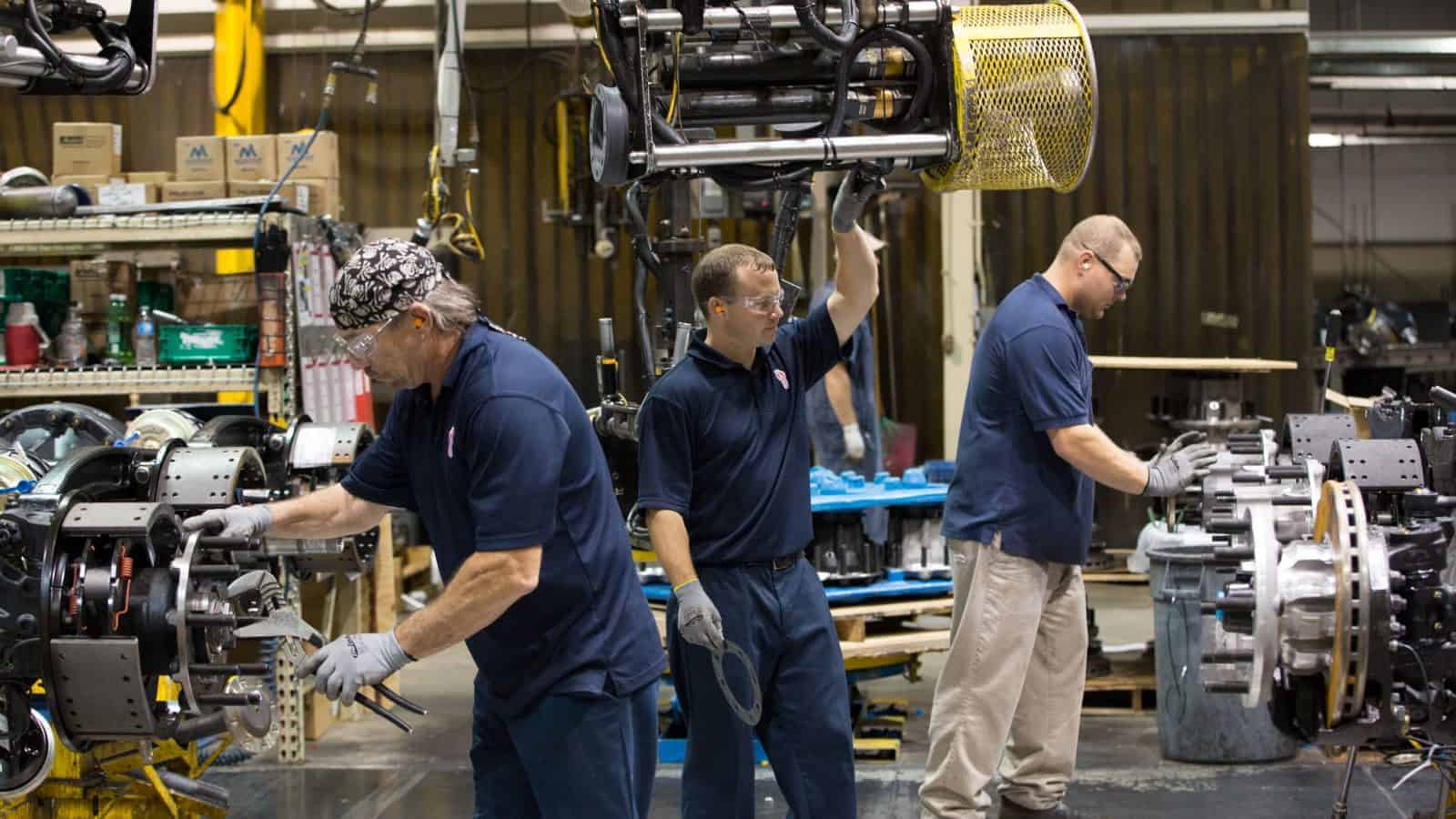Primary Goals: NAM Hits the Road in 2024
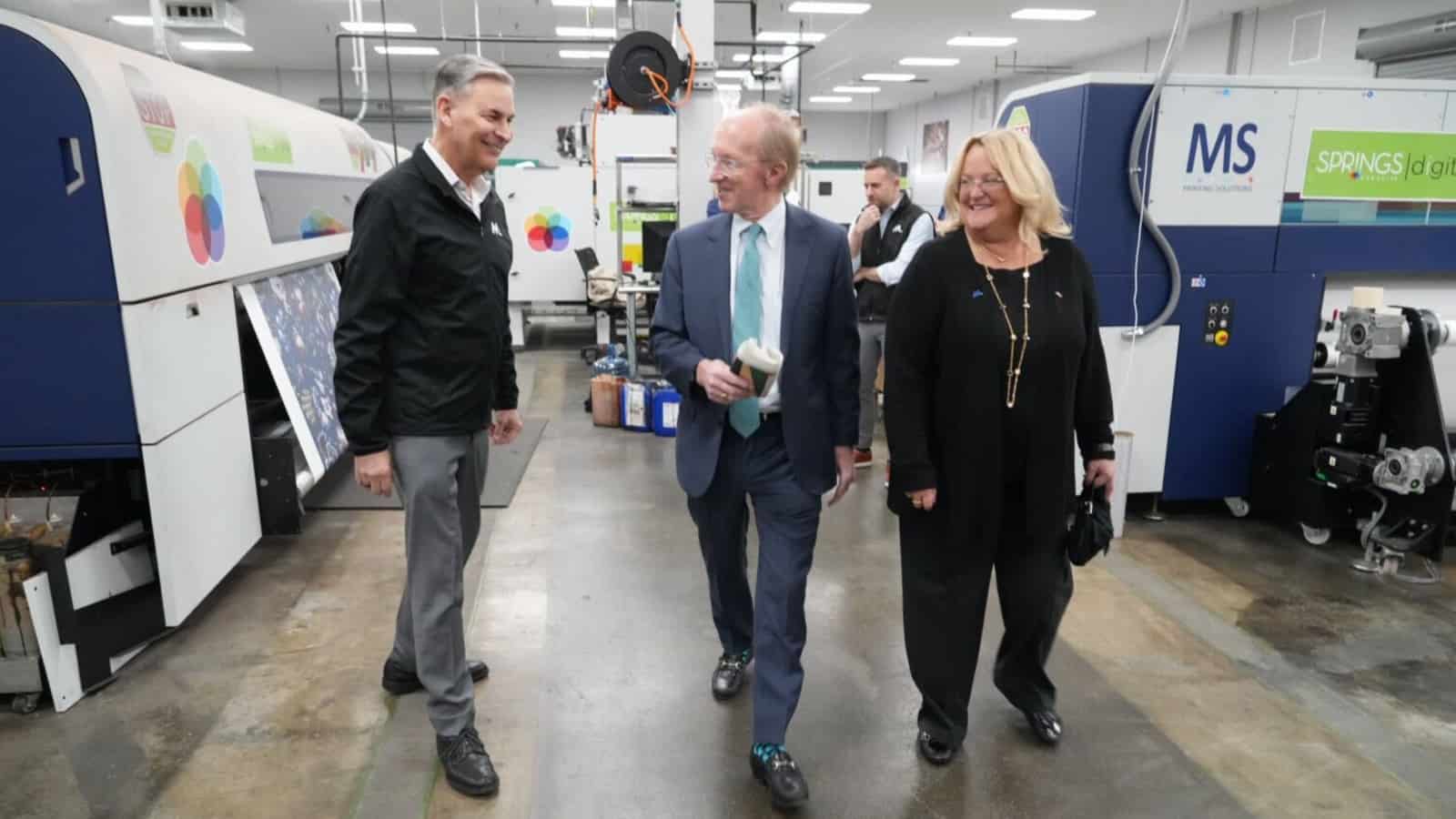
As candidates look to claim the support of manufacturers in 2024, the NAM launched its year-long 2024 Competing to Win Tour in South Carolina, days ahead of the South Carolina GOP primary.
- The tour spotlights the issues critical to winning not just manufacturers’ votes but also more manufacturing in the U.S.
Why it’s important: “We came to South Carolina to showcase the people and stories behind our industry and to translate their perspectives into action that will make our industry and country stronger,” said Johnson & Johnson Executive Vice President and Chief Technical Operations & Risk Officer and NAM Board Chair Kathy Wengel, who joined NAM President and CEO Jay Timmons, South Carolina Chamber of Commerce President and CEO Bob Morgan and South Carolina Manufacturers Alliance President and CEO Sara Hazzard on the first day of the tour.
- “Building these strong relationships beyond Washington, D.C., in the cities and states driving our sector deepens our understanding of regional challenges and reinforces the NAM as the leading voice representing all manufacturers, large and small,” Wengel added.
The launch: The tour began at Milliken & Company’s headquarters in Spartanburg on Wednesday, a poignant reminder of the importance of just one global technology-based manufacturer to lives, innovation and progress.
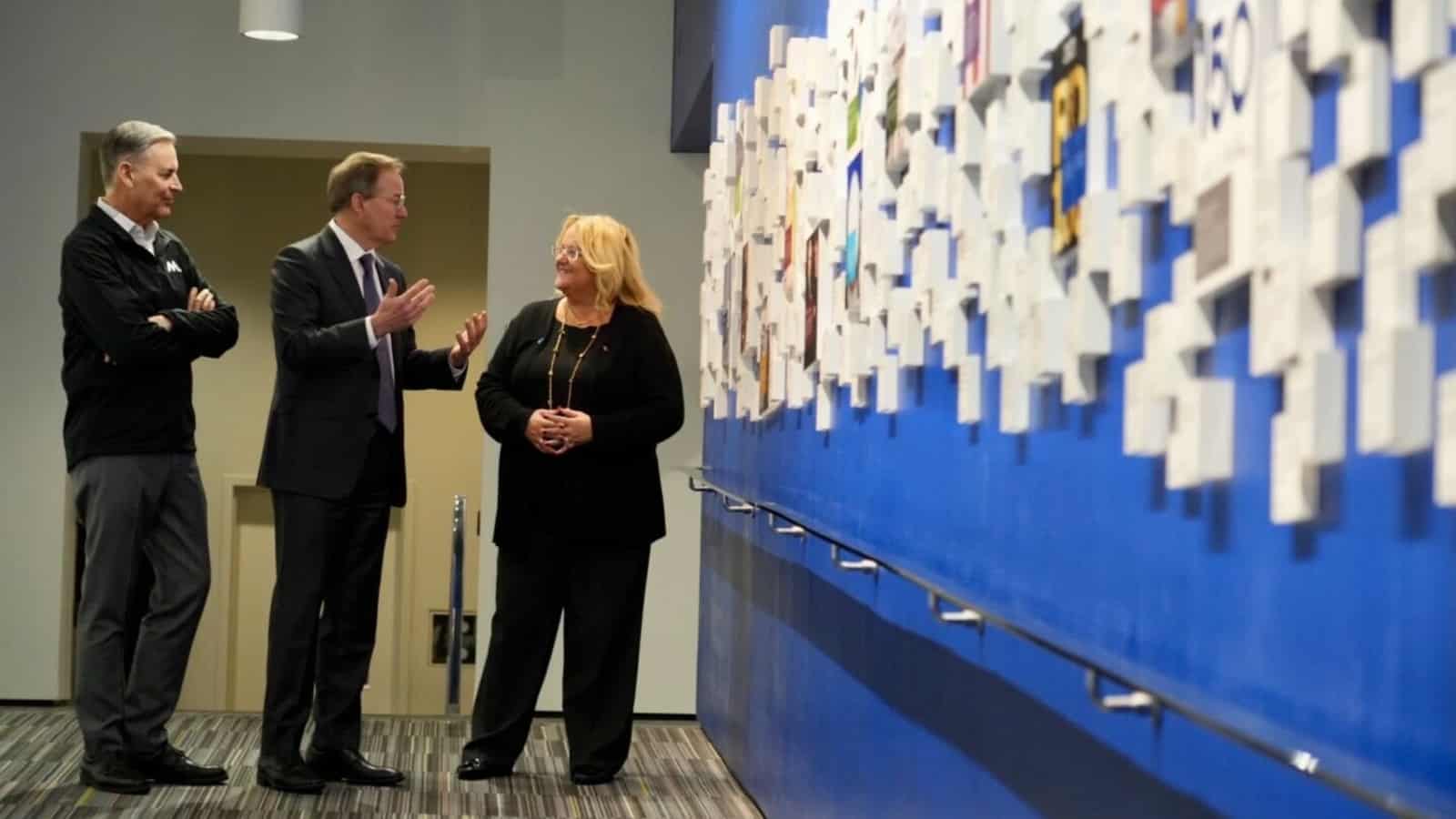
- The company’s 3,200 associates in the Palmetto State, as well as its broader U.S. and global team, make everything from safety gear and wound dressings and bandages to eco-conscious materials and technological innovations, such as digital printing, flooring, sustainable coating additives and more.
- “The average person touches about 30 to 50 [Milliken products] a day,” said Milliken President and CEO Halsey Cook.
- “Milliken embodies what we believe: manufacturing makes a positive difference. Their commitment to sustainability, ethics (named a World’s Most Ethical Company 17 years running) and a people-first workplace create a ripple effect,” said Timmons. “It’s why we need everyone supporting the success of manufacturers in South Carolina and the United States—to empower companies just like Milliken and help us grow more of them right here in America,” Morgan emphasized.
- “Milliken is a remarkable brand ambassador for the entire manufacturing industry in the United States,” summed up NAM Managing Vice President of Brand Strategy Chrys Kefalas. “As Michael Brown, Milliken’s executive vice president of operations, conveyed to us, the company is showing that digital transformation and artificial intelligence can be a force for good, helping its people leverage data analytics, for example, accelerating innovation and making modern manufacturing even more exciting for the next generation to be a part of.”
A boom story: Springs Creative Products Group CEO Derick Close, who heads several small enterprises in South Carolina, brought the NAM tour to Fort Lawn, South Carolina, where state-private partnerships and sound competitiveness policies have led to a boom in manufacturing investment and jobs.
- According to Close, recent investments in the community exceed $2.5 billion and stand to add 1,500 new jobs.
- Close, who is an economic development champion for South Carolina, took time to brief the group on how the area is ground zero as well in the story of the revival—and revolution—happening for the U.S. textile manufacturing sector, showing that U.S.-based textile manufacturers can compete against the rest of the world at quality, speed and price, so long as misguided policies don’t impede current advances. Springs Creative’s digital printing facility, which the NAM toured, is just one example. Springs Creative produces fabrics for such companies as Disney, Tempur-Pedic and Walmart.
- An added highlight of Close’s showcase was a tour of the new 1.5-million-square-foot, $423 million E. & J. Gallo wine and spirits production and distribution center—a testament to U.S. ingenuity and the more than 275 jobs it’s already created (with more on the way) to produce the best-selling spirit in the U.S.
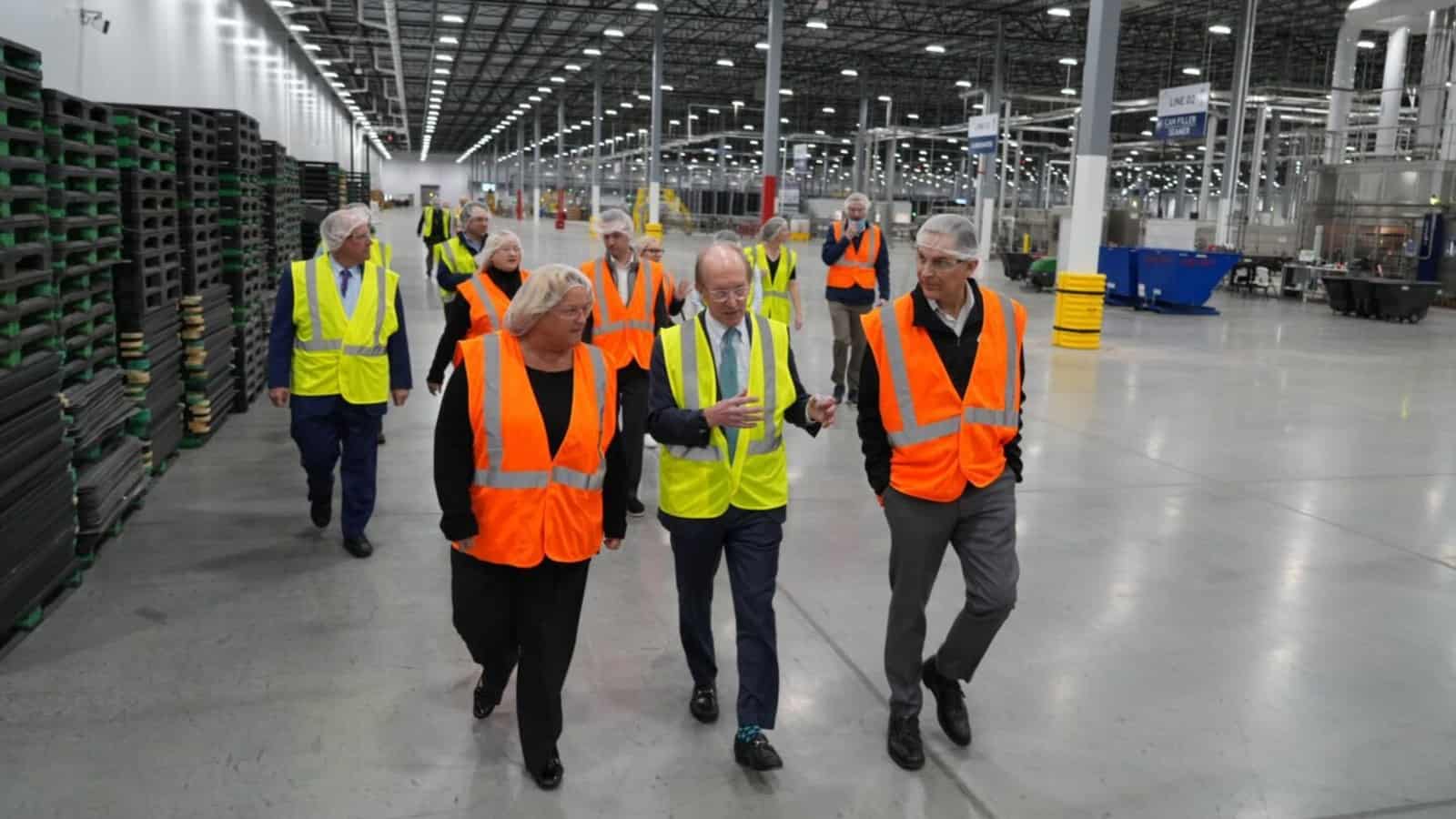
The message: The discussions at Milliken and Springs Creative focused on the need for policies that support manufacturing’s growth, from R&D incentives and competitive taxes to sensible regulations, resilient supply chains and permitting reform, to workforce development, including immigration reform, and energy policy.
The platforms: As newsrooms dwindle, the NAM is stepping into the breach, using its platforms, like NAM.org, social media and its email newsletters, including Input, to amplify manufacturing’s narrative. It’s a bid to ensure that as policymakers and candidates court manufacturers, they’re armed with real stories and concrete policy needs from the ground.
Looking ahead: The tour will continue across the United States, gathering insights and stories to bolster the NAM’s advocacy efforts. Next up: the Competing to Win Tour brings the NAM State of Manufacturing Address to Roseville, Michigan, as well as to Sanders Chocolate and Triumph Gear Systems in Macomb County on Thursday.
NAM Leadership Kicks Off Competing to Win Tour in South Carolina
Washington, D.C. Today, the National Association of Manufacturers kicked off its 2024 Competing to Win Tour in South Carolina. NAM President and CEO Jay Timmons and NAM Board Chair and Johnson & Johnson Executive Vice President and Chief Technical Operations & Risk Officer Kathy Wengel visited Milliken & Company and Springs Creative Products Group to hear from team members on the shop floor on the issues impacting their businesses.
“Manufacturers are fueling the U.S. economy and driving innovation to create a better future for everyone. We’re here in South Carolina to showcase the people and stories behind our industry, and to translate their perspectives into action that will make our industry and country stronger. Building these strong relationships beyond Washington, D.C., in the cities and states driving our sector deepens our understanding of regional challenges and reinforces the NAM as the leading voice representing all manufacturers, large and small,” said Wengel.
Tomorrow, Timmons will deliver the 2024 NAM State of Manufacturing Address, in which he will provide the industry’s assessment of manufacturing in the United States, as candidates from all sides work to claim the manufacturing vote in the 2024 election.
“For more than a decade, the annual NAM State of Manufacturing Address has focused the nation’s attention on the industry that is the backbone of the American economy, and we are on this tour to hear from the people making decisions on how to grow their businesses every day. Lawmakers from all parties want to claim they stand with manufacturers, but we judge them not by their words but by their deeds. So manufacturers across America have a message for Washington: we are here to hold all candidates and leaders accountable. It takes leadership from both parties to ensure manufacturers have the conditions to thrive and invest in communities across the country. If they fail to act, they will fail the 13 million people who make things in America,” said Timmons.
Timmons will also highlight the challenges facing manufacturers in America and the urgent need to enact a competitiveness agenda that addresses pressing issues, including the looming tax hikes on small manufacturers, the need to expand trading opportunities, the regulatory onslaught from federal agencies, the failure of Congress to address immigration reform and the threats to our energy security and supply chains.
-NAM-
The National Association of Manufacturers is the largest manufacturing association in the United States, representing small and large manufacturers in every industrial sector and in all 50 states. Manufacturing employs nearly 13 million men and women, contributes $2.85 trillion to the U.S. economy annually and accounts for 53% of private-sector research and development. The NAM is the powerful voice of the manufacturing community and the leading advocate for a policy agenda that helps manufacturers compete in the global economy and create jobs across the United States. For more information about the NAM or to follow us on Twitter and Facebook, please visit www.nam.org.
Can a Factory Offer Flexible Work Schedules?
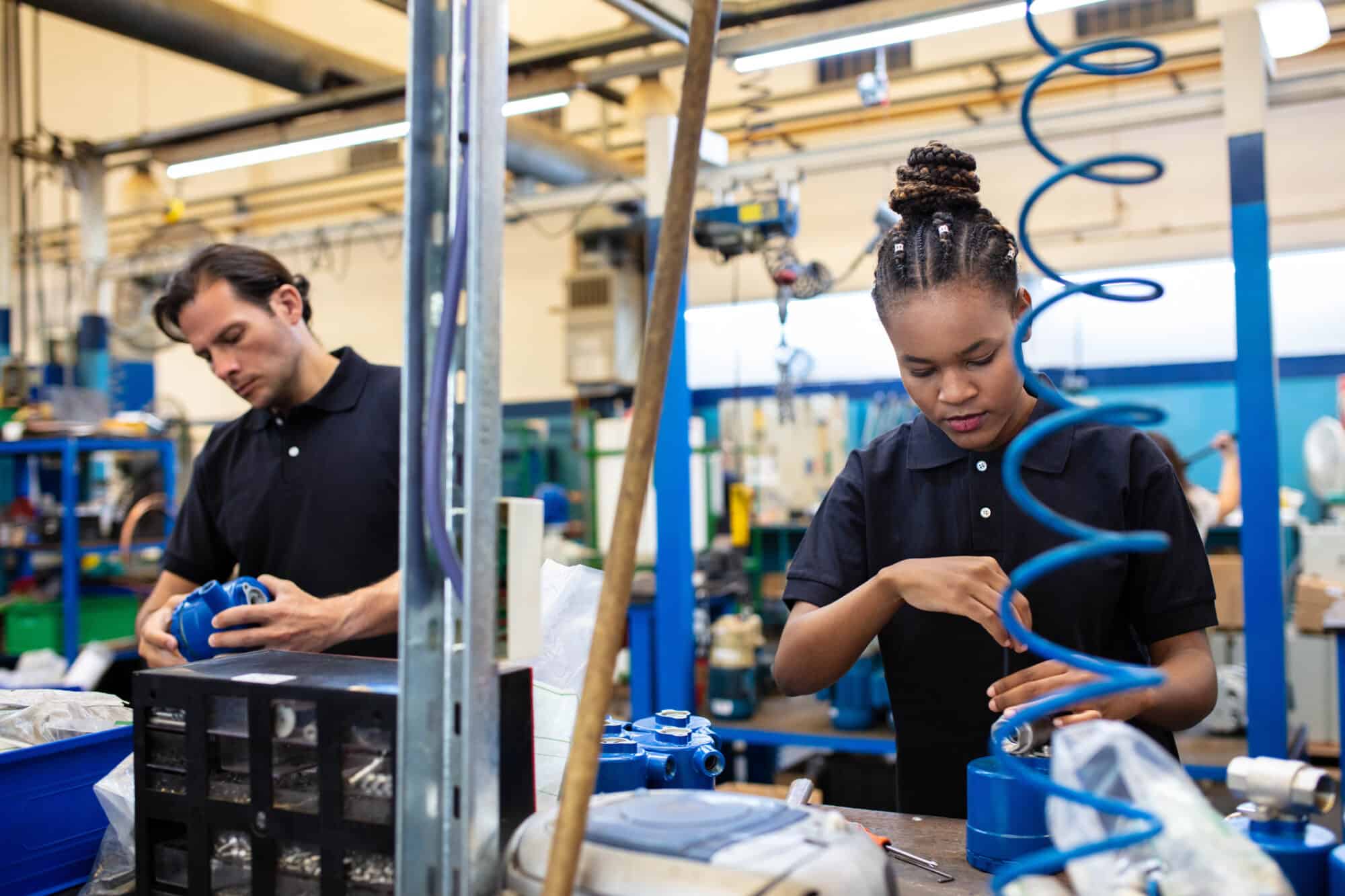
Manufacturing operations are meticulously scheduled and dependent on consistent in-person labor—so how can employers in the sector give workers the flexibility that many want?
With competition for workers remaining fierce, it’s a question that the Manufacturing Institute (the NAM’s workforce development and education affiliate) has started to tackle. Now, manufacturers looking into providing flexible options can consult a new MI whitepaper that draws on real companies’ experiences and decision-making processes.
The new reality: Flexibility is a high priority for workers nowadays, as the MI’s own research shows.
- “Nearly 50% of manufacturing employees cite flexibility as a reason they stay with their employer, with 63.5% reporting that they would look for more flexibility in their next role if they were to leave their current company.”
Figuring it out: So how are manufacturers adjusting? According to a working group of 17 companies convened by the MI, many manufacturers have started by surveying their workers and talking through options with them.
- While feedback from current employees is often a prime motivator for companies considering flexible work arrangements, some manufacturers also pursue them to attract a wider pool of prospective workers—including parents of young children, who may put a premium on flexibility.
What’s on offer: As feedback from the working group showed, manufacturers are considering a wide range of creative options. The whitepaper cites several intriguing examples, which should give other manufacturers ideas for their own operations.
- One manufacturer in the group was trying out different shift options, remarking that they’re “exploring 4–9s and 4–10s primarily as well as adding a Sunday second shift and having folks on rotating shifts.”
- Other companies organized teams of “floaters.” At one firm, these employees work limited hours on different shifts and acquire a large variety of skills. While not full-time, such positions offer a viable option for workers in search of considerable flexibility.
- Shift swapping was another option under discussion, with one company allowing workers to swap up to a week at a time, so long as a supervisor approved.
How to get started: Check out the full whitepaper for more useful tips, including a toolkit to help companies start making these complex decisions on their own.
- Here is the recommended first step: “Identify the objectives that your company hopes to achieve in providing workplace flexibility by focusing on the challenges that you would like to solve, whether it’s increasing the number of applicants or reducing turnover and absenteeism. Establish your baseline by evaluating your company’s status on these metrics.”
- Manufacturing employers can learn more about effective approaches to flexibility for production employees at the MI’s upcoming workshop March 19–20 in Washington, D.C. Check out more details from the MI here.
The last word: As one working group participant said, “At our company, we’ve seen what workplace flexibility means for our production workers. The change in company culture is so valuable.”
House Passes NAM-Supported Tax Package

Manufacturers scored a major victory last night when the House passed a bipartisan tax package containing provisions critical to the industry.
What’s going on: The House voted 357–70 to pass the bipartisan Tax Relief for American Families and Workers Act. The bill includes three important manufacturing priorities:
- Restoring immediate R&D expensing for domestic research
- Reinstating full expensing (also known as 100% accelerated depreciation) for businesses’ capital investments
- Returning the U.S. to a pro-growth interest deductibility standard
What it means: The measure will enable manufacturers to invest in their businesses, create jobs and compete in the global marketplace.
- The bill is particularly important for small and medium-sized manufacturers, many of which experienced significant tax increases as a result of the expiration of these pro-growth provisions.
- “While it was once a paid expense, R&D is now a cost that many small businesses cannot afford,” said Carol Miller (R-WV), in a speech on the House floor last month.
- The overwhelming majority—89%—of respondents to the NAM’s Q4 2023 Manufacturers’ Outlook Survey said higher tax burdens on manufacturing would make it more difficult for them to hire, buy new equipment and expand their facilities.
What’s next: It’s critical that the Senate now also pass the measure, the NAM said.
- “Manufacturers thank [House Speaker Mike Johnson (R-LA)] and [House Ways and Means Committee Chairman Jason Smith (R-MO)] for their leadership in passing the Tax Relief for American Families and Workers Act—and the bipartisan work in the House and Senate to secure progress for America’s manufacturing workers,” said NAM President and CEO Jay Timmons in a social post Wednesday night. “Manufacturers are now counting on the Senate to act quickly to restore these provisions that are absolutely critical to strengthening America’s competitiveness and growth of manufacturing in America.”
- Added Ketchie President and Owner and NAM Small and Medium Manufacturers Group Chair Courtney Silver, “This just isn’t about numbers on my financial statements and my tax returns—this is about taking care of the people here [at Ketchie] and in communities across this country…. Let’s restore some common-sense tax provisions, and let’s support our American manufacturers across our country.”
House Passage of Tax Priorities a Win for Manufacturers, Counting on Senate to Act Swiftly
Washington, D.C. – Following House passage of the Tax Relief for American Families and Workers Act of 2024, National Association of Manufacturers President and CEO Jay Timmons and Ketchie President and Owner and NAM Small and Medium Manufacturers Group Chair Courtney Silver released the following statement:
“Manufacturers thank Speaker Johnson and Chairman Smith for their leadership in passing the Tax Relief for American Families and Workers Act—and the bipartisan work in the House and Senate to secure progress for America’s manufacturing workers,” said Timmons.
“Manufacturers are now counting on the Senate to act quickly to restore these provisions that are absolutely critical to strengthening America’s competitiveness and growth of manufacturing in America,” Timmons added. “We cannot afford to wait. The cost of delay or inaction will be measured in lost jobs and slower wage growth, along with investment ceded to other countries. Passing this legislation, however, will ensure that small manufacturers, who are the backbone of communities and foundation of America’s supply chain, can continue driving our nation forward.”
“When key tax provisions expired, it wasn’t just businesses like Ketchie that felt the pinch—it was our ability to support and create jobs that took a hit,” said Silver. “I thank Speaker Johnson and Chairman Smith for their efforts to ensure passage of the Tax Relief for American Families and Workers Act. This isn’t just about numbers on financial statements; it’s about taking care of people who make things in America and work at small manufacturing companies across our country.”
-NAM-
The National Association of Manufacturers is the largest manufacturing association in the United States, representing small and large manufacturers in every industrial sector and in all 50 states. Manufacturing employs nearly 13 million men and women, contributes $2.85 trillion to the U.S. economy annually and accounts for 53% of private-sector research and development. The NAM is the powerful voice of the manufacturing community and the leading advocate for a policy agenda that helps manufacturers compete in the global economy and create jobs across the United States. For more information about the NAM or to follow us on Twitter and Facebook, please visit www.nam.org.
NAM to Congress: Pass Crucial Tax Legislation Now
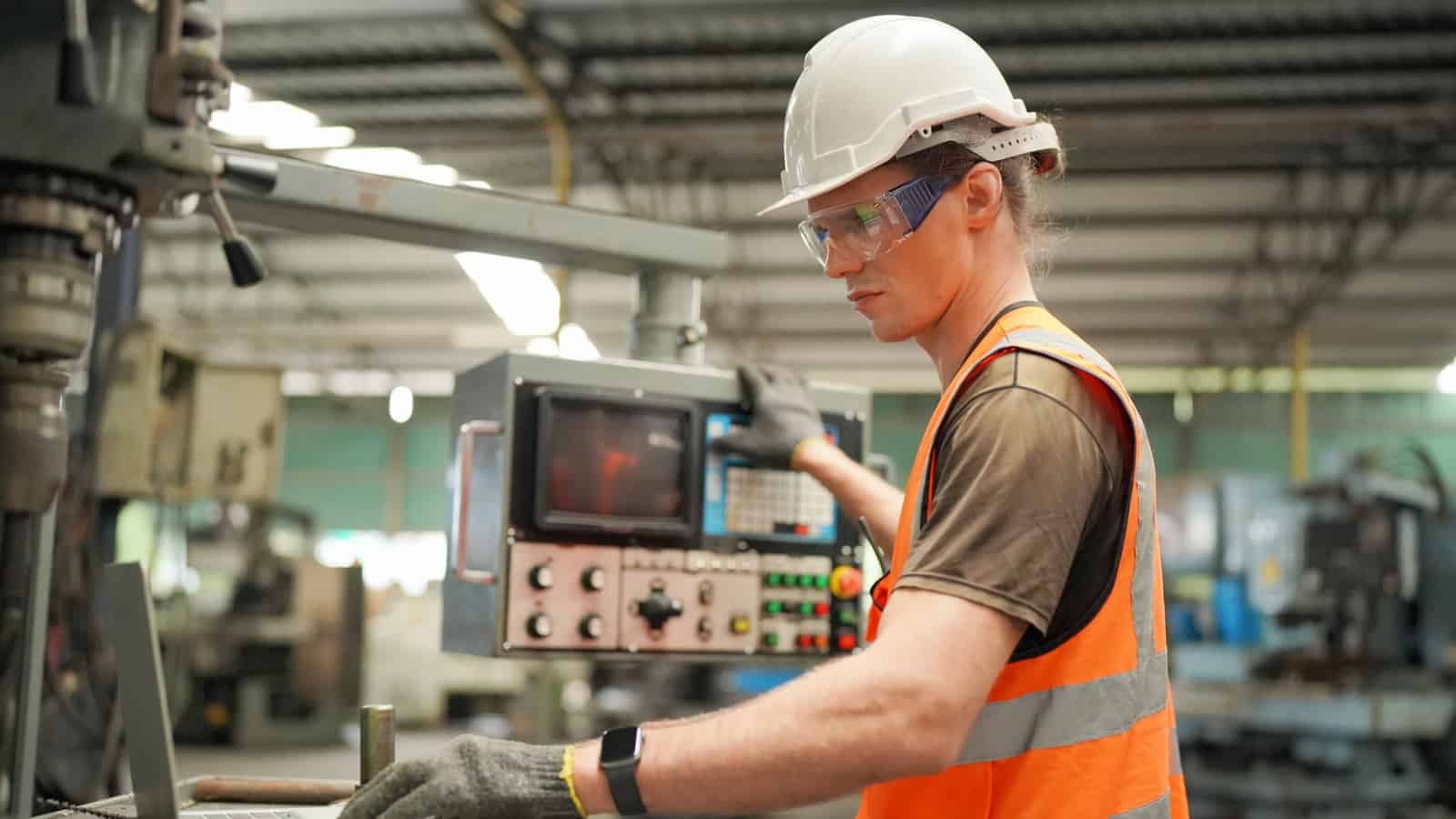
Earlier this month, Congress unveiled the bipartisan Tax Relief for American Families and Workers Act—and now it’s time it passed the legislation, the NAM recently urged congressional leaders.
What’s going on: The bipartisan tax package—a compromise between House Ways and Means Committee Chairman Jason Smith (R-MO) and Senate Finance Committee Chairman Ron Wyden (D-OR)—would restore immediate R&D expensing for businesses, reinstate full expensing (also known as 100% accelerated depreciation) for businesses’ capital investments and return the U.S. to a pro-growth interest deductibility standard.
- Thanks to the NAM’s advocacy, the House Ways and Means Committee supported moving the legislation to the House floor by a bipartisan vote of 40–3.
- A vote on the House floor is expected tomorrow or Thursday, thanks in part to the NAM’s work.
Why it’s important: “All three of these tax policies have a long history of bipartisan support and are critical to strengthening America’s global competitiveness,” the NAM, along with more than 260 other businesses and allied groups, told House Speaker Mike Johnson (R-LA), House Minority Leader Hakeem Jeffries (D-NY), Senate Majority Leader Chuck Schumer (D-NY) and Senate Minority Leader Mitch McConnell (R-KY) earlier this month.
- The policies “have enabled U.S. businesses to innovate, create [well]-paying jobs, protect our national security and remain at the cutting edge of the global economy. Restoring these provisions will have a profound impact on business investment, economic growth and job creation.”
Small businesses: The policies are particularly crucial for small- and medium-sized manufacturers, said Courtney Silver, president and owner of precision machining company Ketchie Inc. group chair of NAM Small and Medium Manufacturers Group.
- The absence of these three tax “provisions directly impacts our ability to invest in new technology, to purchase equipment and to create jobs,” she said.
- “Nearly 90% of manufacturers share similar concerns about their higher tax burden, and if left unaddressed, our companies and our teams will have a harder time securing an edge over our global competitors. … Passing this law would give companies like ours the certainty needed to plan for growth and more investments.”
What you can do: Your members of Congress need to continue to hear why it is imperative they support this tax package. Add your voice at the NAM’s Tax Action Center.
Small Manufacturer: Tax Legislation Restores Commonsense Provisions, Would Provide Big Jolt for Manufacturers of all Sizes
Washington, D.C. – Ketchie President and Owner and National Association of Manufacturers Small and Medium Manufacturers Group Chair Courtney Silver released the following statement calling on Congress to advance key tax priorities included in the Tax Relief for American Families and Workers Act of 2024.
“There is so much at stake for small and medium-sized manufacturers as Congress debates pro-growth tax policy, which is why I strongly support the Tax Relief for American Families and Workers Act,” said Silver. “When Congress allowed immediate R&D expensing, interest deductibility and full expensing to expire, it created a higher tax bill and tremendous uncertainty for businesses like mine. The loss of these provisions directly impacts our ability to invest in new technology, to purchase equipment and to create jobs. Nearly 90% of manufacturers share similar concerns about their higher tax burden, and if left unaddressed, our companies and our teams will have a harder time securing an edge over our global competitors.
“This legislation restores those commonsense provisions, which would be a big jolt for manufacturers of all sizes. Passing this law would give companies like ours the certainty needed to plan for growth and more investments in our future.”
-NAM-
The National Association of Manufacturers is the largest manufacturing association in the United States, representing small and large manufacturers in every industrial sector and in all 50 states. Manufacturing employs nearly 13 million men and women, contributes $2.85 trillion to the U.S. economy annually and accounts for 53% of private-sector research and development. The NAM is the powerful voice of the manufacturing community and the leading advocate for a policy agenda that helps manufacturers compete in the global economy and create jobs across the United States. For more information about the NAM or to follow us on Twitter and Facebook, please visit www.nam.org.
Manufacturing Associations Descend on Capitol Hill to Press for Renewal of Miscellaneous Tariff Bill
Washington, D.C. – Yesterday, the National Association of Manufacturers, American Chemistry Council and CropLife America, along with representatives from 16 manufacturing companies and other business and agriculture groups, joined together to meet with 17 congressional offices, including 15 lawmakers and staff on the House Ways and Means Committee, urging immediate action to renew the Miscellaneous Tariff Bill.
“Manufacturers in the U.S. cannot afford this direct economic hit and need action to be taken as soon as possible. Passing MTB legislation will increase competitiveness, spur growth and support the success of manufacturers, farmers, businesses, workers, consumers and communities throughout the U.S., said the NAM.
“The American Chemistry Council and our members support the renewal of the Miscellaneous Tariff Bill. The MTB would support advanced manufacturing in the United States and domestic chemical production used to make products in key agriculture and food production and industrial sectors, including information technology, renewable energy and automotive goods.”
“The passage of a Miscellaneous Tariff Bill that is fully retroactive would help maintain farmers’ access to the essential pesticide products they need to grow food for the U.S. and the world. A renewed MTB would mean lower input prices resulting in decreased price pressures for U.S. farmers, ranchers and consumers,” said CropLife America.
The previous MTB expired in December 2020, and since then, manufacturers and other businesses continue to pay $1.3 million per day in tariffs—that amounts to $1.5 billion over three years that should and can be invested in job creation and innovation.
-NAM-
The National Association of Manufacturers is the largest manufacturing association in the United States, representing small and large manufacturers in every industrial sector and in all 50 states. Manufacturing employs nearly 13 million men and women, contributes $2.85 trillion to the U.S. economy annually and accounts for 53% of private-sector research and development. The NAM is the powerful voice of the manufacturing community and the leading advocate for a policy agenda that helps manufacturers compete in the global economy and create jobs across the United States. For more information about the NAM or to follow us on Twitter and Facebook, please visit www.nam.org.
-CropLife America-
Established in 1933, CropLife America (www.croplifeamerica.org) represents the developers, manufacturers, formulators, and distributors of plant science solutions for agriculture and pest management in the United States. CropLife America’s member companies produce, sell, and distribute virtually all the necessary and vital pesticide and biotechnology products used by American farmers. CLA can be found on Twitter at @CropLifeAmerica.
-American Chemistry Council-
The American Chemistry Council’s mission is to advocate for the people, policy, and products of chemistry that make the United States the global leader in innovation and manufacturing. To achieve this, we: Champion science-based policy solutions across all levels of government; Drive continuous performance improvement to protect employees and communities through Responsible Care®; Foster the development of sustainability practices throughout ACC member companies; and Communicate authentically with communities about challenges and solutions for a safer, healthier and more sustainable way of life. Our vision is a world made better by chemistry, where people live happier, healthier, and more prosperous lives, safely and sustainably—for generations to come.
Jennifer Abril to Chair NAM’s Council of Manufacturing Associations
Washington, D.C. – The National Association of Manufacturers announced new 2024 leadership for its Council of Manufacturing Associations at the CMA 2024 Winter Leadership Conference. Jennifer Abril, president and CEO of the Society of Chemical Manufacturers & Affiliates, will serve as chair, and Alison Bodor, president and CEO of the American Frozen Food Institute, will serve as vice chair.
“The CMA’s mission is to demonstrate the vital importance of manufacturing to the American economy,” said Abril. “In collaboration with the NAM, the CMA’s member associations will advocate for job creation, investment and innovation in American manufacturing. The strength and weight of the CMA’s voice is unparalleled, and I am honored to serve as the champion for our collective industries’ resilience and growth.”
Made up of more than 200 industry-specific manufacturing associations representing 130,000 companies worldwide, the CMA creates powerful partnerships across the industry, working with the NAM to unite the manufacturing association community, and ultimately the broader business community, around strategies for increased manufacturing job creation, investment and innovation in America.
“Jennifer and Alison have been instrumental to the success of the CMA, particularly in pushing back against an onslaught of unsustainable regulations that would crush President Biden’s goal of growing manufacturing in the United States,” said NAM President and CEO Jay Timmons. “We are confident that they will work in their expanded roles to amplify manufacturers’ voices and further position our industry for global leadership.”
Abril has led SOCMA since 2016. Prior to that, she served as the president of the International Fragrance Association, North America and held leadership positions at the American Chemistry Council. She previously served as CMA vice chair.
Newly appointed 2024 CMA board members include the following:
- Stephen Kaminski, president and CEO, National Propane Gas Association
- Kelly Mariotti, president and CEO, Association of Home Appliance Manufacturers
- Ellen Thorp, executive director, EPDM Roofing Association
-NAM-
The National Association of Manufacturers is the largest manufacturing association in the United States, representing small and large manufacturers in every industrial sector and in all 50 states. Manufacturing employs nearly 13 million men and women, contributes $2.85 trillion to the U.S. economy annually and accounts for 53% of private-sector research and development. The NAM is the powerful voice of the manufacturing community and the leading advocate for a policy agenda that helps manufacturers compete in the global economy and create jobs across the United States. For more information about the NAM or to follow us on Twitter and Facebook, please visit www.nam.org
Policymakers Demand Tax Action

On Thursday, members of Congress took to the House floor to show their strong support for manufacturers’ top tax priorities.
- The NAM is waging an all-out campaign to restore these pro-growth provisions, and key House members added their voices by calling on congressional leadership to schedule a vote as soon as possible.
What’s going on: Yesterday evening, a group of House members lined up for short speeches urging their peers in the chamber to join them in making three immediate tax changes: reinstating immediate R&D expensing; loosening a strict interest limitation; and returning to full expensing (also known as 100% accelerated depreciation) for capital investments.
- Kevin Hern (R-OK) highlighted the harm to America’s competitiveness caused by Congress’ failure to act, asking, “How can we expect to compete with China when it is more expensive to invest, innovate and grow here in the United States of America?”
- Jodey Arrington (R-TX) echoed that message, saying Congress can “supercharge America’s competitiveness” by giving businesses the certainty to plan job-creating investments.
Why it’s important: Without the restoration of immediate R&D expensing, a pro-growth interest deductibility standard and full expensing for capital investments, manufacturing jobs, R&D and competitiveness will all be in jeopardy.
- In the NAM’s Q4 2023 Manufacturers’ Outlook Survey, 89% of respondents said higher tax burdens on manufacturing activities would make it more difficult to expand their workforces, invest in new equipment or expand their facilities.
Take action: Manufacturers’ voices are crucial during the ongoing negotiations. Visit our Tax Action Center to send your own message about these tax priorities directly to Congress.
